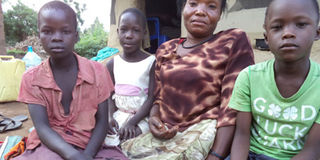Self-pity was not an option

Concy Anena shares a moment with three of her children. She fends for them solely. Photo by By Alice Adikin
Concy Anena, a resident of Kasubi, Gulu Municipality was orphaned at the age of 15. The 35-year-old who was born crippled in Palabong Village, Amuru District was adopted by her maternal uncle who took care of her for five years before she began living on her own.
“Although my uncle was taking good care of me, I believed it was good for me to move to an urban area to look for a way to survive because I do not think he could continue providing my needs,” explains Anena.
The first born of three, Anena was not fortunate to get an education like her siblings because her parents did not have means to facilitate her movements to school and there were few schools nearby.
“I want to see my children attain the education that I never got. That is why I will never ignore my parental role of provision towards my children because I wish the best for them. I would rather struggle to see them excel than live in self-pity that can never bear fruit,” says the mother of four.
Her marital life
Anena says she got married to her ex-husband who was a security guard in Gulu Town and they stayed happily married for eight years before he lost his job and abandoned her with their four children in 2012 (three girls and one boy) whom now she takes care of single handedly. Her children who are between ages of 12 to six, and in primary school keep asking her about their father although only the oldest remembers what he looks like.
Her husband left when their last born was six months and only makes telephone calls once in a while to find out how the children are.
“I think he wants to find out their progress so that he comes and steals them from me when they have grown up to take them for marriage. Ever since he left, he has never bothered to send any financial assistance to his children and has never taken me to his home in West Nile. I strongly believe he is now thinking in monetary terms rather than helping them get better education since we have more daughters,” she points out. She believes that he was not interested in a permanent relationship with her.
“Now I strongly believe he was staying with me because he wanted me to support him and his family because he had other children here whom I was taking care of,” says Anena.
How she manages life
Without a wheel chair to facilitate her movement, Anena says she wakes up at 6am and crawls as she begins her daily routine of preparing her children for school then cleans her home. She travels to Gulu main market by boda boda to buy food items for sale in her stall that sits in her home compound.
Apart from selling food items, Anena also knits table clothes for sale, a skill she learnt from her peers when she was still young. She sells a set of table clothes for Shs50,000 to Shs80,000.
This helps her to raise the money for her children’s school fees, provide for basic needs at home and to rent her single grass thatched house for Shs15,000 a month.
Challenges
However, she says the war in SouthSudan has affected her table cloth business because most of her clients were buying and selling the table clothes in South Sudan.
She has trained her eldest daughter to handle domestic chores thus she has help at home, while her neighbours also give assistance when her children are at school.
Unlike other persons with disabilities of her type, who have got opportunities of being facilitated with wheel chairs to ease their movements, Anena says in her case, chances keep evading her, yet she could be travelling a lot for commercial purposes.
She is grateful to God for provision and the gift of life, thus she goes for prayers every Sunday.
Hard worker
Anena’s neighbour Rose Auma who always helps her whenever her children are at school, says Anena is a very hardworking woman, loving and cooperative. “ She is not full of self pity despite her circumstances but sees herself like any other human being who can change this world.”




